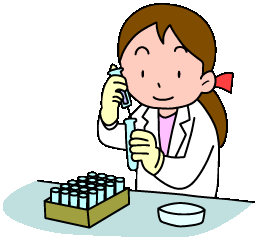| |
| |
|
Tests |
Normal Ranges
(Adults) |
Explanation |
Meanings |
Possible Diseases |
|
|
Red Blood Cell Count
(RBC) |
Male・・・
400〜550
Female・・・
360〜500
×104/μl
(Microliter) |
Red blood cell is a large part of the blood and makes the
red color of the blood. Red blood cells are been continually producing in bone
marrow. It transports oxygen from the lungs to body tissue and carbon dioxide
from body tissue to the lungs. |
Decrease lack
of cells transporting oxygen throughout the body.Anemia occurs. lack
of cells transporting oxygen throughout the body.Anemia occurs.
Increase blood
is thick and bad flow, and the blood vessels may be blocked. blood
is thick and bad flow, and the blood vessels may be blocked. |
High polycythemia,
thrombosis etc polycythemia,
thrombosis etc
Low Iron
deficiency anemia, pernicions anemia, megaloblastic anemia, aplastic anemia,
hemolytic anemia etc Iron
deficiency anemia, pernicions anemia, megaloblastic anemia, aplastic anemia,
hemolytic anemia etc |
| |
Hemoglobin (Hb) |
Male・・・
14〜18
Female ・・・・・・
12〜16
g/dl
(Deciliter) |
Hemoglobin is the protein-iron compound in the red blood
cells. It is composed of heme and globin protein. Heme is an iron containing
cofactor that enables it to carry oxygen to and carbon dioxide away from the
body's cells. |
Diagnose anemia. |
High polycythemi polycythemi
Low Iron
deficiency anemia, aplastic anemia, pernicions anemia, megaloblastic anemia,
hemolytic anemia,blood loss anemia, etc Iron
deficiency anemia, aplastic anemia, pernicions anemia, megaloblastic anemia,
hemolytic anemia,blood loss anemia, etc
|
| Hematocrit (Ht)ヘマトクリット |
男性・・・
38〜50
女性・・・
34〜45
% |
Hematocrit measures the percentage of red blood cells in
the total blood volume. The solid element (red blood cells) and the fluid part
(serum) of the blood are separated with a centrifugal separator. |
Low thin
blood thin
blood
High thick
blood thick
blood
RBC, Hb, and Ht. together is used in diagnosing types of anemia and dehydration
etc. |
MCV
(Mean Cellular Volume)
(平均赤血球容積) |
81〜98
fl(femtoliter) |
Measuring the average size of the red blood cells, small,
large or normal. |
Diagnosing the causes and types of anemia.
|
Liver dysfunction, anemia of chronic renal failure,
leukemia, inflammation, Vitamin B12 deficiency anemia...
|
MCH
(Mean Cellular Hb)
(平均赤血球血色素量) |
27.0〜33.5
pg(ピコグラム) |
The average amount of hemoglobin within a red blood cell. |
MCHC
(Mean Cellular Hb
Concentration)
(平均赤血球血色素濃度) |
32.0〜35.0
% |
the average concentration of hemoglobin in the red blood
cells. |
Reticulocyte Count
(RETC)
網状赤血球数 |
0.5〜1.5
% |
Reticulocytes are immature red
blood cells.
RETC is used to diagnose anemia and bone marrow function. |
Measuring of the capacity of the bone marrow to make
new red blood cells (reticulosytes).
High more
red blood cells are being made by the bone marrow. more
red blood cells are being made by the bone marrow.
Low bone
marrow failure bone
marrow failure |
Hing hemolytic
anemia, iron deficiency anemia, megaloblastic anemia etc hemolytic
anemia, iron deficiency anemia, megaloblastic anemia etc
Low Aplastic
anemia, myelofibrosis, acute leukemia etc Aplastic
anemia, myelofibrosis, acute leukemia etc |
ESR
赤沈(血沈) |
Male・・・
1〜12
Female・・・
2〜15
mm/h |
ESR measures the rate at which red blood cells separate from
plasma (the liquid part of blood) and fall to the bottom of a test tube. The
test is nonspecific. Abnormal ESR can be seen in many diseases. As the test
is simple, it is used to screen for diseases. |
Erythrocyte Sedimentation rate(ESR) |
|
WBC

|
Leucocyte Count
(WBC)
白血球数 |
3.5〜9.0
×104/μl
|
When bacteria and foreign particles enter the body, a large
numbers of white blood cells are produced, and the WBC number in the blood
increases.
White blood cells surround and destroy foreign substances is called phagocytosis. |
The increased WBC generally indicates
there is a possible infection and inflammation in the body. |
High Amygdalitis,
appendicitis, pneumonia, cholecystitis, pancreatitis, pyelonephritis, cardiac
infarction, leukemia, septicemia, drug poisoning, injury etc. Amygdalitis,
appendicitis, pneumonia, cholecystitis, pancreatitis, pyelonephritis, cardiac
infarction, leukemia, septicemia, drug poisoning, injury etc.
Low collagen
disease, pernicions anemia, aplastic anemia, radiation hazard and chemotherapy
damage, bone marrow dyfunction, hypersplenia etc collagen
disease, pernicions anemia, aplastic anemia, radiation hazard and chemotherapy
damage, bone marrow dyfunction, hypersplenia etc |
| |
Platelet count
(PLT)
血小板数 |
13.0〜34.9
×104/μl
(microliter) |
Platelet has the functions of adhesion and cohesion. When
bleeding from a wound occurs, the platelets gather at the wound and form a
plug to block the blood flow. |
Diagnosing
the hemostatic function of the body.
Increase the
blood is easily congealed the
blood is easily congealed
Decrease Bleeding
is hard to stop. Bleeding
is hard to stop.
|
High myelogenous
leukemia, essential thrombocythemia, polycythemia etc myelogenous
leukemia, essential thrombocythemia, polycythemia etc
Low thrombopenic
purpura, pernicions anemia, aplastic anemia, leukemia, hepatocirrhosis etc. thrombopenic
purpura, pernicions anemia, aplastic anemia, leukemia, hepatocirrhosis etc. |
Leucocyte
(Differential Count)
白血球の分類(血液像) |
Neutrophil・・・
40〜70
Eosinophil・・・0〜5
Monocyte・・・
0〜2
Basophil・・・
3〜7
Lymphocyte・・・
20〜45
%
|
There are five main types of white cells in responding to
the invading of bacteria and foreign particles in the body. They are neutrophils,
eosinophils, monocytes, basophils, and lymphocytes.
Each of them not only has a different shape but plays a specific role in the
body. |
Leucocyte differential count measures
the relative numbers of WBCs in the blood so that the relative diseases can
be diagnosed.
|
|
Copyright(C) Katayama
Child's Clinic  |  Back
to Top Back
to Top |
 What
do the Blood Tests tell us??
What
do the Blood Tests tell us??